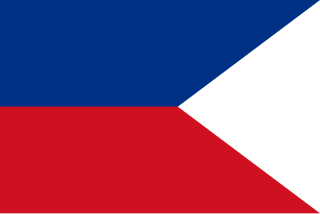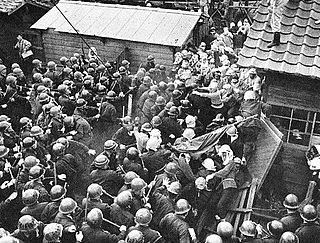
The Occupation of Japan was a military occupation of Japan in the years immediately following Japan's defeat in World War II. Led by the United States with the support of the British Commonwealth and the supervision of the Far Eastern Commission, the occupation lasted from 1945 to 1952 and involved a total of nearly 1 million Allied soldiers. The occupation was overseen by American General Douglas MacArthur, who was appointed Supreme Commander for the Allied Powers by US President Harry Truman; MacArthur was succeeded as supreme commander by General Matthew Ridgway in 1951. Unlike in the occupation of Germany, the Soviet Union had little to no influence over the occupation of Japan, declining to participate because it did not want to place Soviet troops under MacArthur's direct command.
Shuntō (春闘) is a Japanese term, usually translated as "spring wage offensive." It refers to the annual wage negotiations between enterprise unions and the employers in Japan. Beginning in February or March each spring, thousands of unions conduct wage negotiations with employers simultaneously.
The General Council of Trade Unions of Japan, often abbreviated to Sōhyō (総評), was a left-leaning union confederation. Founded in 1950, it was the largest labor federation in Japan for several decades.

The Japan Socialist Party was a socialist political party in Japan that existed from 1945 to 1996. The party was founded as the Social Democratic Party of Japan by members of several proletarian parties that existed before World War II, including the Social Mass Party, the Labour-Farmer Party, and the Japan Labour-Farmer Party.

The British Commonwealth Occupation Force (BCOF) was the British Commonwealth taskforce consisting of Australian, British, Indian and New Zealand military forces in occupied Japan, from 1946 until the end of occupation in 1952.
Labour unions emerged in Japan in the second half of the Meiji period, after 1890, as the country underwent a period of rapid industrialization. Until 1945, however, the labour movement remained weak, impeded by a lack of legal rights, anti-union legislation, management-organized factory councils, and political divisions between “cooperative” and radical unionists.
Community unionism, also known as reciprocal unionism, refers to the formation of alliances between unions and non-labour groups in order to achieve common goals. These unions seek to organize the employed, unemployed, and underemployed. They press for change in the workplace and beyond, organizing around issues such as welfare reform, health care, jobs, housing, and immigration. Individual issues at work are seen as being a part of broader societal problems which they seek to address. Unlike trade unions, community union membership is not based on the workplace- it is based on common identities and issues. Alliances forged between unions and other groups may have a primary identity based on affiliations of religion, ethnic group, gender, disability, environmentalism, neighborhood residence, or sexuality.
The National Railway Workers' Union (NRU) is a Japanese trade union, which is usually referred to as Kokurō (国労) in Japanese. Historically, Kokurō represented many of the workers who worked for Japanese National Railways (JNR), from which the union derived its name. For several decades in the postwar period, Kokurō was one of the most powerful unions in Japan, with a membership in the hundreds of thousands, before falling into decline. As of 2016, Kokurō had just 9,000 members.

The Miike Struggle was a year-long struggle in Japan in 1960 between the organized labor movement, backed by a variety of left wing groups, and big business organization, backed by the Japanese right, centering around a lengthy labor dispute at the Mitsui Miike Coal Mine on the west coast of Kyushu in southern Japan. Occurring at the climax of a long series of escalating strikes and other militant labor actions in 1950s Japan, the Miike Struggle was the largest labor-management dispute in Japanese history. Ultimately, the labor movement in Japan was defeated at Miike, dealing a significant blow to its prospects going forward.

Suehiro Nishio was a Japanese labor activist and party politician whose career extended across the prewar and postwar periods. A long-serving member of the National Diet, he was a power broker in the Japan Socialist Party and one of the main leaders of the Right Socialists. He served as Deputy Prime Minister of Japan during the cabinet of Hitoshi Ashida, and in January 1960, he led a breakaway faction out of the Japan Socialist Party to found the new Democratic Socialist Party.

Hirokichi Nadao was a Japanese politician. Throughout his career, he served as Minister of Education multiple times, Speaker of the House of Representatives, Minister of Health and Welfare, and Governor of Oita Prefecture.
The Japan Postal Workers' Union was a trade union representing workers at Japan Post.
Motofumi Makieda was a Japanese trade union leader.
The National Union of General Workers is the name of:
The All Japan Transport and General Workers' Union was a trade union representing workers in the transport sector in Japan.
The Japan Federation of Medical Workers' Unions is a trade union representing workers in the healthcare sector in Japan.
The Japan Central Federation of National Public Service Employees' Unions was a trade union representing civil servants in Japan.
The Japan Federation of National Public Service Employees' Unions is a trade union representing public sector workers in Japan.

Kaoru Ōta was a Japanese trade union leader. He served as chairman of the General Council of Trade Unions of Japan (Sōhyō) from 1958 to 1966. Known for his cheerful demeanor and energetic activism, Ōta's many forceful statements in defense of the Japanese workers were affectionately known as the "Ōta Trumpet".
Akira Iwai was a Japanese trade union leader. He served as the secretary-general of the General Council of Trade Unions of Japan (Sōhyō) from 1955 to 1970.







